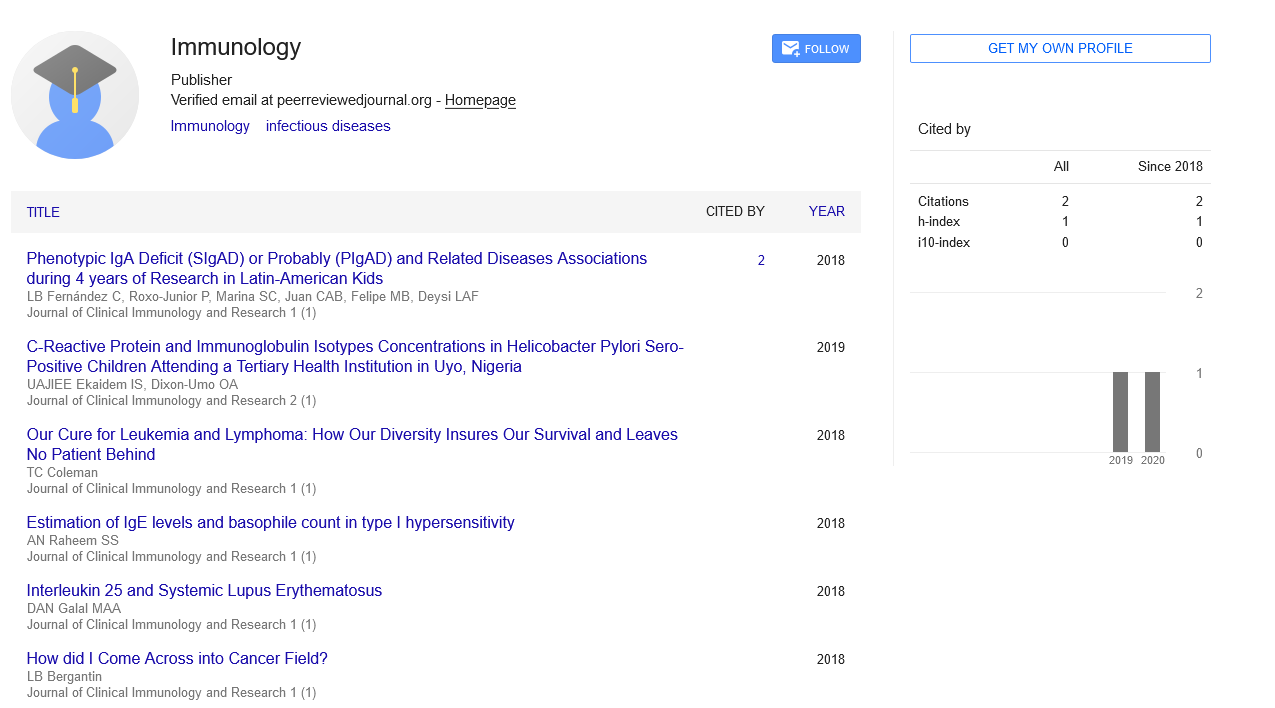Opinion Article, J Clin Immunol Res Vol: 6 Issue: 3
Immunological Biomarkers in Infectious Diseases: From Diagnosis to Prognosis
Huilio Biox*
1Department of Immunology and Technology, Georgia Health Sciences University, Augusta, USA
*Corresponding Author: Huilio Biox,
Department of Immunology and Technology,
Sciences Georgia Health University, Augusta, USA
E-mail: Bioxhulio73@gmail.com
Received date: 02 September, 2023, Manuscript No. JCIR-23-116298;
Editor assigned date: 04 September, 2023, PreQC No. JCIR-23-116298 (PQ);
Reviewed date: 18 September, 2023, QC No. JCIR-23-116298;
Revised date: 25 September, 2023, Manuscript No. JCIR-23-116298 (R);
Published date: 05 October, 2023, DOI: 10.4172/JCIR.100090.
Citation: Biox H (2023) Immunological Biomarkers in Infectious Diseases: From Diagnosis to Prognosis. J Clin Immunol Res 6:3.
Description
Immunological biomarkers have become invaluable tools in the management of infectious diseases. The significance of immunological biomarkers in infectious disease research and clinical practice plays important role in curing infectious disease. Their role in diagnosing infections, assessing disease severity, monitoring treatment responses, and predicting outcomes.
Infectious diseases continue to pose significant global health challenges. Timely and accurate diagnosis, effective treatment monitoring, and prognostic assessments are crucial for managing infectious diseases. Immunological biomarkers, which reflect the host's immune response to pathogens, have emerged as valuable tools in achieving these goals.
Immunological biomarkers
Immunological biomarkers encompass a diverse array of molecules and cellular components involved in the host immune response to infections. These biomarkers can be detected in various bodily fluids, such as blood, urine, and cerebrospinal fluid.
Diagnosis of infections
Immunological biomarkers play a pivotal role in the accurate and timely diagnosis of infectious diseases:
Antibodies: The presence of pathogen-specific antibodies, such as IgM and IgG can indicate recent or past infection. Serological assays are widely used for diseases like hepatitis, HIV and COVID-19.
Antigen detection: Detection of microbial antigens, such as viral proteins or bacterial cell wall components, is a common approach in diagnosing infections like influenza and streptococcal pharyngitis.
Cellular biomarkers: Cellular components like T cells and neutrophils can be assessed to diagnose certain infections, such as tuberculosis, through assays like the Tuberculin Skin Test (TST) and Interferon-Gamma Release Assays (IGRAs).
Assessing disease severity
Immunological biomarkers are instrumental in evaluating the severity of infectious diseases:
Cytokines: Elevated levels of pro-inflammatory cytokines like Interleukin-6 (IL-6) and tumor necrosis factor-alpha can signify a hyperactive immune response and severe inflammation, as seen in severe sepsis.
Lymphocyte counts: Decreased lymphocyte counts, known as lymphopenia, can indicate immune suppression, often observed in advanced stages of HIV infection or severe COVID-19.
Monitoring treatment responses: Immunological biomarkers aid in assessing the effectiveness of therapeutic interventions.
Viral load: Monitoring viral load through Polymerase Chain Reaction (PCR) assays is essential in evaluating antiviral treatment responses, as in the case of Hepatitis C or HIV.
Antibody titers: Monitoring changes in antibody titers can indicate the success of vaccination or convalescent plasma therapy, as demonstrated in COVID-19 management.
Procalcitonin: Elevated procalcitonin levels have been associated with poor outcomes in bacterial infections, guiding clinical decisions regarding antibiotic therapy.
CD4 cell counts: In HIV/AIDS management, CD4 cell counts serve as prognostic markers, helping predict the risk of opportunistic infections.
Challenges and future directions
Variability: Biomarker levels can vary widely among individuals, complicating interpretation.
Specificity: Some biomarkers may not be specific to a particular infection, leading to misdiagnosis.
Dynamic nature: Biomarker levels can change rapidly during the course of an infection, requiring frequent monitoring.
Conclusion
Immunological biomarkers have become indispensable tools in the fight against infectious diseases. They aid in early and accurate diagnosis, provide insights into disease severity, guide treatment decisions, and offer prognostic information. The ongoing research in this field continues to uncover new biomarkers and refine their clinical applications. The integration of immunological biomarkers into infectious disease management will remain a cornerstone of precision medicine, enabling more effective interventions, improved patient outcomes, and better global health security.
 Spanish
Spanish  Chinese
Chinese  Russian
Russian  German
German  French
French  Japanese
Japanese  Portuguese
Portuguese  Hindi
Hindi 